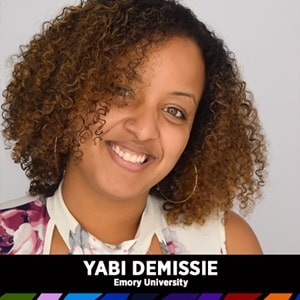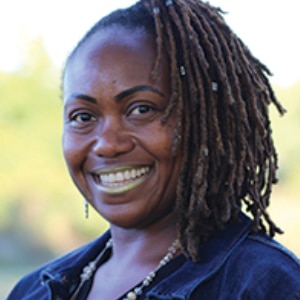Closing the Gap: Where Are They Now … with Yabi Demissie
This month we are featuring Yabi Demissie, the assistant director of alumni engagement at Emory University and a member of the 2021 Closing the Gap cohort, at which time she was at Georgia State University as coordinator for student engagement.
Yabi, tell us how you got your start in student affairs.
I went to undergrad at University of South Florida pursuing a career in public health. I started out as a criminology major because I just want to help people and thought I wanted to work in the prisons…until I went to a prison and I cried walking out because I thought, I can’t see myself working here. It was then that I switched over to public health.
I was a very highly involved student leader on campus. I was in a student sorority and worked for orientation in a bunch of different organizations holding leadership roles and I saw how much I transformed through my journey because of my mentors and people in my life that helped me see my potential, and I stepped out of my comfort zone. When I graduated I realized a part of my calling is bringing people together for a certain purpose and helping people find their passions and purpose. That’s how I got my start in higher ed.
I got my masters in student affairs in 2017 right after undergrad and that’s where I found my passion with student programming. I oversaw events at Nova Southeastern University and at the same time I worked with a student programming board.
I was very passionate about working with students, and I wanted to put more empowerment on life outside of the classroom as well. So many of my life skills I found outside of the classroom, so I wanted to help students in that realm, challenging them to be their best selves. They were able to see how much they transformed and how much what they’re doing in their professional careers and how much what they did with me developed them or prepared them for life outside of school.

After I got my masters, I came back to Georgia State University for four and a half years. That was on a much bigger scale, and I oversaw programming events, concerts, about 80 events and programs a year, and I supervised a program board. I really burned out when I was at the job. I grew up thinking my job was my purpose, and I think going through that burnout made me realize, that what I’m doing is very important, there’s so much to my calling and what I feel like God wants me to do outside of work.
I transitioned out of student affairs in 2021. I’m still working in education but now I’m in alumni engagement. I found that my passion and engagement doesn’t just have to be with students. I found my passion in engagement and development.
Describe alumni engagement. What do you have the opportunity to do?
I work at Emory University and not many people realize there are departments with individuals that work full time to engage alumni all over the world. Emory University is like a very prestigious school, a lot of our alumni are doctors, doing very smart people things. As part of my job I got to oversee, as a service program, working with alumni all over the world to lead community service projects and engagement opportunities for alumni in their area. For example, I worked with alumni from Spain to promote and bring the other Emory alumni that live in Spain to connect, represent Emory, and show that Emory cares for the community. I also do faculty engagement programs working with the prestigious faculty at Emory to create engagement opportunities for alumni so that once they graduate they still have opportunities to learn from faculty who still work and teach at Emory.
You were part of the second-year cohort of Closing the Gap. What were your expectations for the program?
My initial thought was to build connections. When I joined I was still in the student-facing part of higher education, so I wanted to connect with other colleagues all over the country. It was kind of like a support group and even with some of the struggles that we all go through, sometimes it was good to see that we weren’t alone, that we were facing the same struggles when it comes to politics and things like that.
How did the program enhance your networking skills and your ability to build connections?
I think I learned about networking more in grad school and I’ve just grown over the years to learn how important it is. I ended up in better places when people that I networked with connected me to something rather than me just applying to something on my own. All the jobs and roles that I have held were obtained through networking. This is one of the most important skills I feel like people should have or learn.
The opportunity I had with Closing the Gap confirmed how important networking is; one of the mentors worked at Georgia State so it was nice to connect with her and see that we have that relationship because that’s a whole part of networking as well: figuring out where’s the connection because our field is very small. When you network, you find that connection and now there’s a relationship with people who look out for me and I look out for them. There are so many great things that come from networking in all realms, not just higher education.
How did Closing the Gap impact your decision to make a shift from student affairs to alumni engagement?
I honestly feel it probably gave me more comfort in knowing that I don’t have to stay in the same place if I feel like I want to grow. I think sometimes I attach to things too much and I see my role and who I’m helping and I don’t want to leave; I want to be able to finish what I started with my students. I started to think, what is it I need to do to excel in my career and do what’s best for me? The program was empowering for me, and things still worked out, I still had relationships with my students even though I left the role.
What was the highlight of your experience in the program?
I really learned from the mentor presentations and being in the group was an open space, a judgment-free zone where everyone was super welcoming. The mentors were in some of our talks and their presentations gave us a glimpse of their perspective because there may be a divide between the coordinators, assistant directors, and then leadership, so we got to see their viewpoint on decision-making and how they navigate their position and who they supervise and support. We got to see their viewpoint on decision-making and how they may be stuck in the middle of trying to support the people they’re supervising and meet the expectations of their leadership. I wish I would have had more intentional time with my sponsor as I think there could have been a lot of benefit to it.
What’s the proudest moment of your career so far?
In 2018, nine months into my first professional job my supervisor and colleague left, and I was the only full-time staff member and programmer in our office. In that year, my students and I turned into a true family because of all the hardships that we went through in terms of losing people that were there for years.
We won a regional board of excellence award from the National Association of Campus Activities for boards with a budget of greater than $500,000. That was a huge accomplishment for me, with the help of my leadership. We were one of the first programming boards in a while that started with 11 students and ended with 11 students. Often, people leave the organization due to grades or other situations but that year we kept everyone. We had a reunion a couple months ago. That was my biggest accomplishment because it was a work thing that we turned into a family. We are one of the only programming boards that still communicates almost daily with those students.
And as you look ahead, what is on the career horizon for you.
To be honest, I thought I knew a couple years ago when I was working directly with students. At the time I thought I wanted to be a vice president of student affairs or dean, but now that I’m in another side of education…I really don’t know. What I do know is what I like: program development, engagement, event planning, and bringing people together for a certain purpose. I realized from networking and meeting other people there are so many skills that I’ve gained from education, especially with event planning, budgets, negotiating contracts, and leadership. All of those skills are valuable no matter where I find myself in the future.
What else do you want to share with our readers?
Know your worth and don’t be afraid to advocate for yourself. If you don’t advocate for yourself the answer is already no, but if you do, there’s a risk that they’ll say yes. That’s what has worked for me, the fact that I advocated for myself was why I got approved to attend a national conference. The other thing is, take care of yourself. That’s literally what saved me. If you don’t speak up or say anything you’ll continue to be overworked. Your leaders don’t know what you need until you ask.

